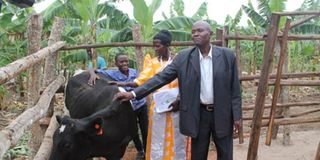When a village in Lwengo District received 24 heifers

Mr and Mrs Dumba of Bwasa village in Lwengo District after receiving their heifer from Send a Cow. Photo by Mike Ssegawa
Three farmers’ groups convened in a small yard before an old mud and wattle house belonging to the family. This is the family house of Mr and Mrs Dumba located in Bwasa village in Lwengo District. Behind this house is the structure, a cowshed that will host the animal this family was about to receive.
The occasion was a happy one. Like the Dumba family, 23 other families in the poor countryside were getting a life changing asset in their household.
The three farmers groups of Kasaana Twegatte, Weyambe Tukuyambwe and Tusubira Farmers, each with about 30 members, have waiting for the last 13 months for heifers that they were told would turn around their lives.
Eighty-seven farmers, mainly women, have undergone training in saving and investment, health education, crop and animal husbandry, among life skills they need to get out of poverty.
Each group has a leader; all women. Halima Namazzi, Evelyn Namakula, and Hellen Bukirwa therefore sat on the front row occupying white plastic chairs as the rest of the villagers watched, clapped their hands and listened to speeches from among others, the district chairman of Lwengo, the notorious disciplinarian, George Mutabazi.
“We have learned how to improve livelihoods of our homesteads, and the nutrition of our household members,” Ms Namazzi, the host and wife of Mr Dumba, said with confidence like an experienced public speaker.
She added, “Today, we are getting 24 heifers and we are all well prepared to manage them. Send a Cow has put us in good hands, including hiring peer farmers, extension workers and veterinary doctors, to mentor and monitor us,” she said.
Timothy, the project manager at Send a Cow, reminded the women who were accompanied by their husbands, to take care of the animals.
Practical advice
“Poor feeding or poor medical care for that animal is a risk factor,” he warned, encouraging farmers to visit one another in order to learn from each other.
On his part, Patrick Sambaga, the country director, emphasized why the cow was important for the household.
The heifers, according to him, give an average 25 litres of milk.
With a firm warning that he would take away an animal that would not realize the minimum 20 litres a day, he said, he expects each household to sell 20 litres of milk a day, which would translate into Shs600,000 a month.
He said, the household should however have enough milk to feed on, and the waste should be well used as manure for the gardens.
Pass on the gift
“That is why we are giving you cows,” he said, adding, it is how they help the families improve their diets and incomes.
He however cautioned them against the habit of dependence on non-government organizations.
“Don’t permanently depend on donors. It is failing us who call ourselves development partners if you are forever on the same level,” he said asking those present to use this as an opportunity to uplift their families and leave those who haven’t gotten a chance to take advantage of the next opportunity.
“We want you to feed well because good nutrition is good for the health of the family and growth of your children.”
He encouraged them to have enough to feed their families and to sell the surplus.
He said heifers need to eat and drink a lot, but also, need extra medical care.
Sambaga said the reason Send a Cow was giving families heifer was to increase the assets of the family, improve their nutrition and incomes.
Ms Immaculate Mayanja, a model farmer in Lwengo, asked the women who got heifers to work alongside their husbands and get them involved in rearing the animals.
Ms Mayanja who is one of the first beneficiaries of Send a Cow training in the district and now has diversified into milk vending, and yoghurt making, warned that raising the animal is lots of hard work and asked the beneficiaries to sell milk without adding water.
“I have a market for your milk,” she pledged to a thunderous applause, as she promoted her yoghurt that she sold out.
District chairman George Mutabazi, the chief guest, said he had identified a company to set up its collection points in every three villages powered with solar to buy milk throughout the year.
Sambaga told Daily Monitor that the heifers cost Shs2.4 million and were aged between five to nine months.
He said Send a Cow has given out more than 3,000 heads of cattle to various communities over the past 20 years in more than 30.
The families that receive heifers pass on the female calf to the neighbour, as a system the organisation uses to multiply the “gift of the cow” throughout the communities to impact on them positively.




